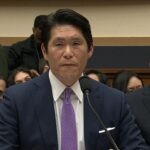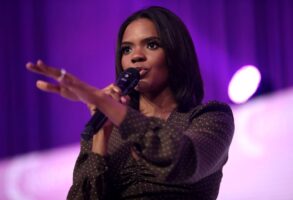
Published June 2, 2023
One of the most famous essays ever written about baseball was penned by Bart Giamatti, the Yale professor-turned-baseball commissioner. At the end of the 1977 season, dreading the long wait until spring, Giamatti said the game of baseball “breaks your heart. It is designed to break your heart.”
Any long-suffering fan has learned that wisdom a little too well. But a distinctly 21st-century form of heartbreak has entered the picture for today’s fans—center field is now a battlefield in the culture war, and many fans have the distinct feeling that those who run their beloved pastime would really prefer they took their business elsewhere. Baseball is part of the fabric of American civic life. When it chooses sides on controversial issues, as the Los Angeles Dodgers are currently doing, everyone feels like they just struck out.
Starting in Chicago in 2001, LGBT-themed nights at the ballpark have become common throughout the sport (the Texas Rangers remain the only MLB team not not to host one.) In 2021, the San Francisco Giants became the first team to wear Pride-themed logos during a game. With 81 home games to sell tickets for and the increased use of Pride-themed branding to advertise everything from Oreo cookies to mouthwash, it’s no surprise franchises would seek to tap into the trend of “rainbow washing.”
But inclusion for some has come to mean exclusion for others. As part of their Pride Night celebrations, the Dodgers invited, then uninvited, then reinvited the “Sisters of Perpetual Indulgence,” a self-described “Order of queer and trans nuns” who “use humor and irreverent wit to expose the forces of bigotry.”
Their target is frequently the Catholic Church. The group’s roster includes such faux-religious ribaldry as Sister Risqué of the Sissytine Chapel, Father Fellatio, Sister Missionary Position, and other less printable mockery of traditional Catholic figures and beliefs. Their motto: “Go forth and sin some more!”
The Dodgers saw fit to bestow the team’s Community Hero Award on the group, despite a fairly pedestrian record of actual impact; per their documents filed with the IRS, the group offers modest grants, between $50,000 and $60,000 to community groups each year. Backlash ensued, but after an initial backtrack, the team reinvited the “Sisters.”
The news came as a betrayal to many longtime Dodger fans, who remembered devout Catholic Vin Scully melodically commentating games for 67 seasons, the “Nuns Days” that used to fill Chavez Ravine with (real) wimples and habits, and the Catholic Bronze Star recipient Gil Hodges playing at first base. The Dodgers seemed content to throw that history away, to the dismay of Catholics like Bishop Robert Barron, until recently an auxiliary bishop in the Archdiocese of Los Angeles, who called for a boycott of the team.
Perhaps more importantly, the players who play the game have begun speaking out as well. Clayton Kershaw, a future Hall of Fame pitcher who has played his entire career for the Dodgers, told the Los Angeles Times he saw the “Sisters” as “a group that was making fun of a religion, [something] that I don’t agree with.” A statement attributed to his Dodger teammate Blake Treinen, currently out with an injury, said the decision to invite a group that “openly mocks Jesus Christ…disenfranchises a large community and promotes hate of Christians and people of faith.”
And Trevor Williams, an eight-year MLB veteran and outspoken Catholic, weighed in on Twitter, saying an MLB “game is a place where people from all walks of life should feel welcomed.” But, he noted, “creating an environment in which one group feels celebrated and honored at the expense of another is counterproductive and wrong,” noting it seemed to contradict the team’s own policies barring prejudice towards other groups.
In an era of cheap talk, when athletes are publicly fêted for vacuous statements about the social justice issue of the day, these words take tremendous bravery. You don’t have to be a baseball fan to recognize the guts it takes to stand on principle against not just popular opinion and sports talk radio shows, but against one’s own employer, in defense of the values one holds dear. When the criticism comes for Kershaw and other players who make their voices heard—and it will—fans should applaud not just their right to speak freely, but the courage in doing so.
But they can simultaneously regret that the remarks were necessary. The game known as America’s pastime has never been politics-free. But it is—or should be—a place where Americans of all ideological stripes can put aside their differences to cheer on the hometown nine.
Conservatives feel like progressives are culture-war aggressors because the simple act of watching a baseball game or popping open a beer is now wrapped up in complex questions of political identity and controversial medical procedures. Boycotts are inarguably a dramatic tool, but many conservatives feel like it’s the only tool left.
Of course, refusing to watch a hometown team is a sacrifice beyond avoiding a mass market beer that no one likes, or a retailer that offers products available at most big box stores. Families have generations of stories bound up in nights with Vin, trips down the 110 to catch a game, impossible victories, and heartbreaking losses.
The execs who run baseball know it takes a lot to break those ties, and know fans will put up with a lot—but the “Sisters” fiasco should be a reminder that those bonds can be severed. If baseball cracks down on the players standing up for what they believe in, or teams continue to push the envelope in welcoming offensive groups and incorporating politicized logos into the field of play, fans looking for an escape from our toxic political divisions will go elsewhere.
The game of baseball is designed to break your heart between the foul lines. The suits in the corporate offices shouldn’t break fans’ hearts even more by needlessly politicizing their game.
Patrick T. Brown (@PTBwrites) is a fellow at the Ethics and Public Policy Center.
Picture from Unsplash
Patrick T. Brown is a fellow at the Ethics and Public Policy Center, where his work with the Life and Family Initiative focuses on developing a robust pro-family economic agenda and supporting families as the cornerstone of a healthy and flourishing society.












